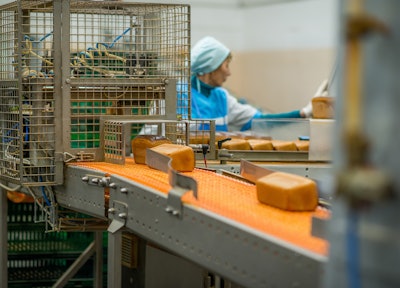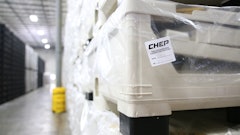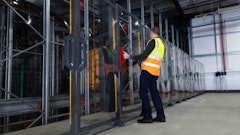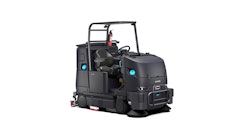
Today's food industry is highly competitive, and processors are challenged to protect and/or improve profit margins while operating as efficiently as possible.
A processor's ability to operate efficiently is heavily dependent on their equipment running consistently and smoothly. Automated packaging processes are one way that processors can help ensure consistency in equipment operations and a way to stay ahead of the competition.
But, along with the benefits of automation comes the need for a reliable maintenance program that will keep equipment running in top form, day in and day out.
The criticality of avoiding disruptions
Consistency is the key to operational efficiency. If you wait until equipment fails to repair it, you're likely losing critical production hours and risking unhappy customers.
You'll also risk unhappy employees who need to work overtime, not to mention additional unplanned costs. It would cost your company in overtime payments, as these employees will have to stay late to finish the job they would have completed on time if the equipment had not failed.
By being proactive or preventing issues before they happen, food processors can win by avoiding costly downtime and improving yield rates.
Think about preventive maintenance the same way you think about maintaining your health with yearly health checkups. Being proactive with your health is a giant step toward protecting your longevity and well-being. Missed checkups may mean a missed opportunity to treat a severe illness before it becomes a serious problem.
Maintaining the health of your business
Let's further illustrate this by talking about your dental health. Flossing and brushing daily are similar to ensuring your food processing systems are cleaned every day and have the right amount of oil and grease in the correct locations.
Scheduling regular dental visits with the experts – dentists and dental hygienists – is critical for identifying potential issues and preventing more expensive health issues from occurring later on. If too much time goes by, root canals, gum issues or crowns may be needed. These fixes are often 5-20 times more expensive, and most could have been prevented had they had been caught earlier on.
The same goes for protecting the health of your business. A proactive approach to equipment maintenance means you'll prevent issues that can cost time and money; it's about preventing a catastrophic issue, which causes downtime that may seriously hurt the health of your business.
Adding the labor conundrum to the mix
Labor shortages have been an ongoing challenge, and some food processors report labor turnover rates of 40-100% per year. As the economy picks up, finding and keeping good maintenance people likely will only get worse.
Automation can help answer labor woes, but maintenance workers are hard to retain and often are not skilled at working with complex mechanical or electronic equipment like rotary chamber, bag loading and vertical packaging machines.
Furthermore, plants don't rebuild these complex machines often enough for the maintenance team to become experts at rebuilding them. It is usually all they can do to keep the machines properly greased, the oil changed on time, and the seal bars and seal tape replaced as needed. Doing heavy-duty work is becoming too complicated and time-consuming for plants.
An outsourced maintenance program staffed by experts that have the technical know-how to service complex automated equipment can be a game-changer and will help these understaffed, inexperienced maintenance teams by doing the yearly rebuilds for the plants.
A prescription for profitability
From keeping operating budgets in check and equipment running efficiently to increasing customer satisfaction, proactive preventive maintenance offers a number of benefits.
- Overall cost savings. With preventive maintenance, overtime costs are reduced due to working on a scheduled basis as opposed to a responsive basis to repair breakdowns. Additionally, the sourcing of spare parts and labor can be planned and purchased more economically in advance. Otherwise, companies end up paying a premium for emergency parts shipping, travel time and after-hours support.
- Reduced energy costs. Preventive maintenance enhances the efficiency of equipment and reduces energy costs by keeping it running more effectively. When equipment is not properly maintained, it uses more energy. Doing simple things like greasing moving parts or changing filters can reduce energy consumption.
- Increased uptime. Fewer machine breakdowns means production downtime is minimized. And, with the ability to schedule planned maintenance work during slower periods, there is less disruption to production schedules.
- Enhanced efficiency and customer satisfaction. When equipment runs smoothly and consistently, everyone benefits. Regular maintenance checkups help minimize any disruption to production schedules so that customers receive consistent, reliable service.
- Look to the future. As automation takes center stage for food processors, forward-thinking maintenance programs that use data capture and remote connectivity for optimal machine performance become even more important to stay competitive.
Saving time and money with the right preventive maintenance program
Choosing the right maintenance program for your business is key to maintaining the health of your business.
Consider a proactive preventive service plan that provides the technical support and expertise to improve the operational efficiency of your equipment. Look for features such as regularly scheduled service visits, equipment audits, and catastrophic parts coverage to help avoid unplanned expenses, increase uptime and improve yield rates.
In an advanced maintenance program, remote connectivity and data capture add another layer to help identify and address immediate issues and find opportunities for enhancement.
How a cloud-based maintenance platform works to improve operational efficiency
When a machine is down, if a maintenance service plan includes a cloud-based remote connection, the maintenance team can see the alarms, look at the production history, and in time, start predicting downtime events based on the data being collected. With this information, it is much easier to determine the problems, troubleshoot the issue and call the plant with repair suggestions. This can dramatically help food processors reduce the amount of time they are down because they get remote help through a smart link to diagnose the issue more quickly.
Additionally, the production numbers gathered via the smart link will help food processors better understand their operations. They will be able to use the reporting to help drive operational improvements.
With an eye on the future health of your business, preventive maintenance services, enhanced by remote monitoring and data capture, can increase system uptime and overall operational efficiency, giving food processors a leg up they need to stay competitive in today's environment.



















